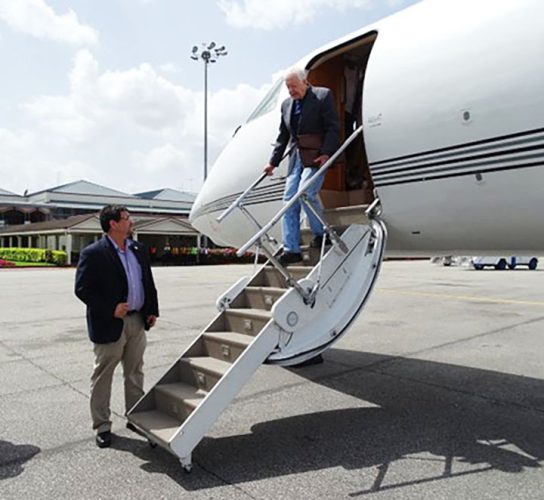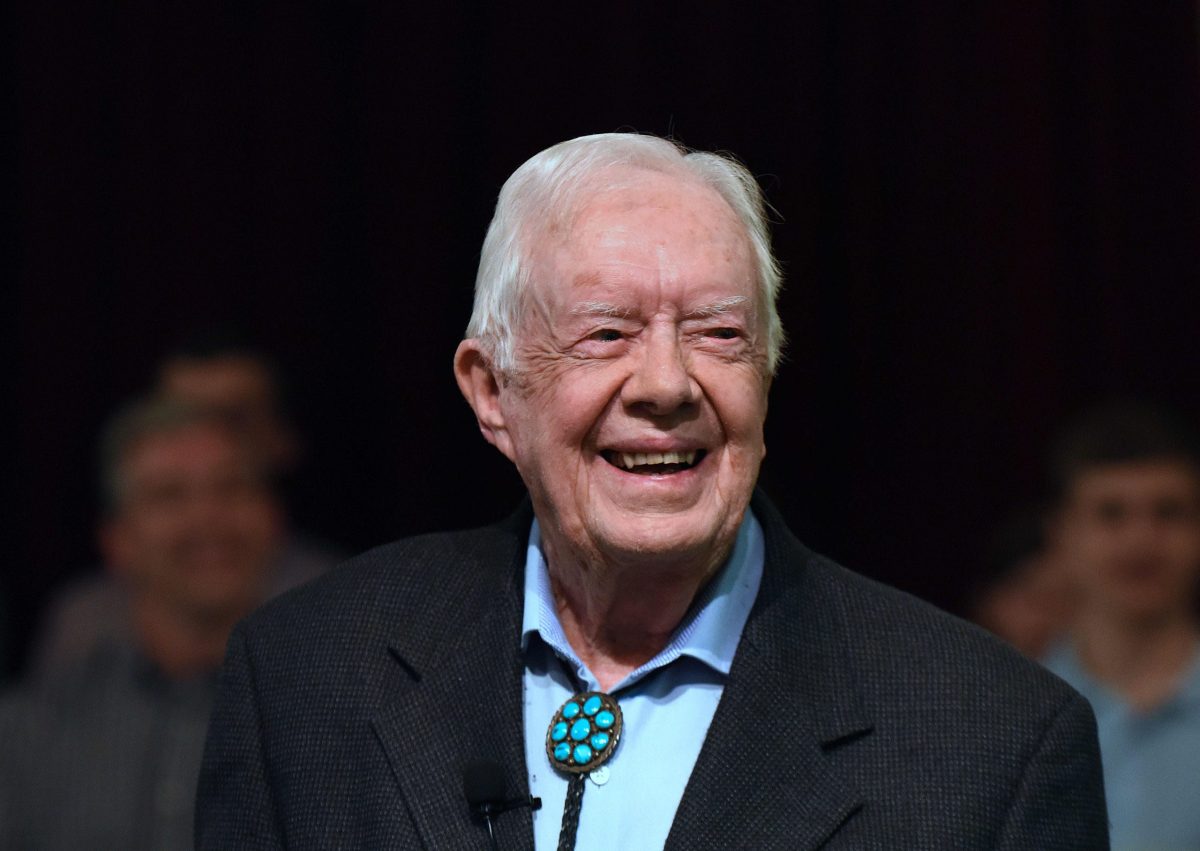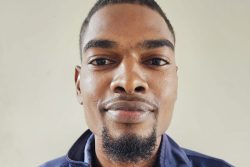-credited with major role in restoration of democracy in 1992
Former US President Jimmy Carter who passed away yesterday in the United States at the age of 100 was widely credited with helping to pave the way for the historic free and fair elections here in 1992 which saw then President Desmond Hoyte transferring power after his party had rigged elections between 1968 and1985.
At the Head of the Carter Center, the former US President paid a visit to Guyana in 1990 and managed to convince a previously adamant Hoyte that there should be counting at the place of the poll, a revamped elections commission and a credible voters list.
His intervention resulted in a political agreement that elections which were due in 1990 be deferred for the implementation of electoral reforms. Hoyte had gone against hardliners in his party who were against yielding to democratic elections and the period leading up to the polls was marred by various controversies.

Elections were finally convened on October 5th 1992 and Carter along with former Belizean Prime Minister George Price arrived at the head of the Carter Center observer mission. While voting went mostly smoothly a crisis erupted later in the afternoon when the Guyana Elections Commission (GECOM) building on Croal Street came under siege by pro PNC protesters who had been mobilized by those in the party who had not wanted the elections to proceed.
Carter was to later write in his memoir “Beyond the White House” that the tense situation that afternoon which saw his team under siege and having to return to the Pegasus Hotel was the greatest danger he had felt since leaving the White House.
An excerpt from his memoir follows:
“The most personal danger I have felt since leaving the White House was in Guyana in 1992. This small nation on the northern coast of South America was then and still is the most completely divided that I know. About 9 percent of its citizens are Amerindians living mostly in the vast forests, and another 80 percent are divided between descendants of indentured servants from India and descendants of African slaves, both brought in by the British during colonial times. The major political parties are largely separated along these racial lines, as are many of the basic professions.
“The Indo-Guyanese hold a slight majority, but the Afro-Guyanese and their People’s National Congress (PNC) party were able to control the government from the time of national independence in 1966, assisted by the government of Great Britain and the CIA, both of which considered Cheddi Jagan, leader of the opposition People’s Progressive Party (PPP), to be a Marxist.
“In 1990, Mr. Jagan came to The Carter Center, claimed that previous elections had been fraudulent, and asked us to help ensure that the next one would be honest and fair. We agreed, provided the ruling party would also accept our presence as observers. For several months, President Desmond Hoyte objected strongly, but public opinion became so greatly aroused that he finally agreed, just one month before the election was scheduled. Bob Pastor and his team developed a list of minimal election standards, and I went to Guyana to discuss them with the president and others. Three of the most important were to have an accurate voters’ list, a politically balanced election commission, and votes counted at the polling places.
“These issues had been hotly debated for almost thirty years and were very difficult for the ruling party to accept. Finally, as I was preparing to leave the country and declare that we could not participate, President Hoyte accepted all our provisions. The election was delayed until October 1992, and government officials also invited observers of the British Commonwealth, with whom they had enjoyed a close and friendly relationship.
“As usual, we deployed our two-person teams throughout the country before Election Day, and I went west along the coast toward the border with Venezuela to visit a few polling sites in a riverine area inhabited by Arawak Indians, traveling from one village to another in a small boat. On the way back to Georgetown, the capital, we flew over the famous site of the 1978 mass suicide of Jim Jones and more than nine hundred of his cult followers. When we arrived at the airport, our small plane was surrounded by members of the security forces, who informed me that riots had broken out all over Georgetown, and that I must go to the U.S. Embassy, where I would be safe.
“Instead, I went to my hotel room and called President Hoyte, who assured me that the police were in charge and order would soon be restored. Bob Pastor informed me that the PNC were obviously losing the election, and that some of their supporters had been induced to disrupt the process. I decided that the election should continue if possible and sent word to our observers to monitor events and, after the polls closed, to go to their assigned places to gather quick count results. Our senior observer, Jennifer McCoy, told me that the election center had come under attack by an angry mob, some of whom claimed to have been denied a ballot. She had visited the building and tried to work out a solution with the PNC party chief, but the riot continued.
“The election center was where all of the communication equipment and computers, on which election results would be tabulated, were located. It was a two-story wooden building with many windows, with the electronic equipment housed in an isolated central room on the second floor. When I arrived, accompanied by three Secret Service agents, the building was surrounded by several hundred rioters, who had already broken all the windows with clubs and stones. There was only one Guyanese police office present, a woman wearing a uniform but without sidearms.
“We went upstairs and found that all the computers had been transferred to one of the more isolated hotels for safekeeping. I phoned the hotel manager, who told me that the computers could not be operated there unless “a battalion of troops is sent to protect us against the mobs trying to stop the vote count.” I called the president again. I told him that I was in the unprotected building and that there was no way to complete the election unless the workers could return with their computers. Also, I told him that our Secret Service would contact the White House if I didn’t receive immediate protection from the mob outside.
“Calm was restored after another hour, and the computers were tabulating returns by midnight. Our quick count showed that the ruling party would lose by about 14 percent, and early the next morning I went to visit both presidential candidates. They agreed to refrain from any public statements and to accept the final results, which were announced three days later. Cheddi Jagan was sworn in as president after what was considered to be the country’s first free and fair election since independence. After his death five years later, his wife, Janet Jagan, became president, but she resigned in 1999 because of poor health.
“The Carter Center has remained in close contact with the people of Guyana and has helped them to work out a long-range plan for economic and political development. A young deputy finance minister, Bharrat Jagdeo, was assigned by the Jagans to work with us on this project, and he performed this duty superbly. When Mrs. Jagan became ill, Jagdeo was chosen to succeed her as president, and he was elected and then reelected in 2001 and 2006. Unfortunately, many of the divisions in Guyana remain”.
National Development Strategy
Later, under the Jagdeo presidency, the Carter Center aided with the crafting of a National Development Strategy which became mired in a stalemate between the governing PPP/C and the opposition PNC.
Carter visited Guyana again in August of 2004 to determine whether there was a prospect of reconciliation between the two parties under Jagdeo and then PNCR Leader Robert Corbin.
He left without being able to achieve compromise and in a press statement had pointed to entrenched positions.
He said in part on August 13, 2004 “Although my faith in the Guyanese people remains, it has been a sobering visit. Except among a few political party leaders, there have been almost universal expressions of concern about the present condition and future hopes of Guyana, based on a failure of political leaders to heal the incompatibility and animosity that characterize their relationship”.
He added “Instead of achieving this crucial goal of inclusive and shared governance, the Guyanese government remains divided with a winner-take-all concept that continues to polarize many aspects of the nation’s life. Most members of parliament are directly dependent upon and responsible to the political party that chooses them, and not to the people whom they profess to represent. There are only spasmodic meetings between political leaders, and publicized agreements reached during those rare and brief sessions have not been fulfilled. The promises of constitutional reform have been frustrated.
“Guyana is blessed with extraordinary human and natural resources, which President Jagdeo and other leaders are struggling heroically to utilize. However, there is little prospect for either substantial economic or social progress unless there is a truce in the political wars. No one party should bear the blame. The traditions and culture of both major political parties are deeply entrenched and have their roots in 50 years of fierce rivalry that denies the legitimacy of the other party’s concerns. This problem can be solved only with basic constitutional changes in the system of governance”.
Carter returned to Guyana in May 2015 to again observe general elections at the head of a team from the Center. He had to cut short the trip as he felt unwell. Later that year he was diagnosed with brain cancer.
In the middle of 2018, Carter made an attempt to stimulate dialogue between the Granger administration and the then opposition PPP/C but there was no progress.
His Carter Center team was one of the key observer missions at the 2020 general elections. It was not allowed back into the country by the APNU+AFC government for the recount.










